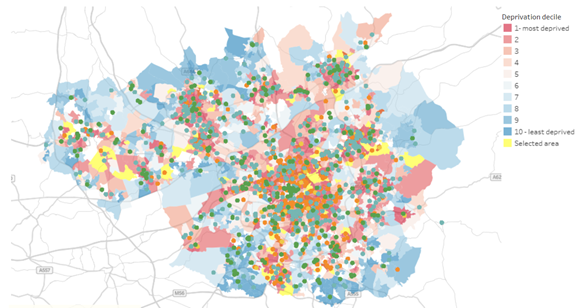
Research: Health
Overview
The Greater Manchester Population Health Plan (opens in a new window) sets out a bold and ambitious approach to transforming the health, wealth and wellbeing of our 2.8 million residents.
Achieving this is central to the vision of making Greater Manchester one of the best places in the world to grow up, get on and grow old.
We work closely with the Greater Manchester Health and Social Care Partnership to support this ambition by putting data and intelligence at the heart of planning and decision making. This includes:
- Working with the Partnership’s population health programmes, advising on data collection, reporting, analysis, and evaluation
- Using analytical methods to think about data differently, providing insight into the health of the Greater Manchester population and informing the Partnership’s priorities
We also make links between population health and wider strategy, policy, and delivery. Particularly in relation to important factors that affect people’s health, such as housing and employment, and also in changing the way people receive public services. This forms part of Greater Manchester Combined Authority's powers to improve health outcomes and reduce health inequalities.
We also work closely with public health analysts from Public Health England and the ten local areas of Greater Manchester to:
- Share knowledge about analytical tools and techniques
- Enable access to data and tools so that we have consistently high-quality analysis across the city-region
- Coordinate research and analysis, to boost capacity and reduce duplication of effort
Make training and development opportunities available to further develop a highly-skilled and motivated team of experienced analysts
About Us
The GM Population Health Intelligence Team was established in late 2018 and brings together analysts from the Greater Manchester Health and Social Care Partnership Population Health Team with members of the GMCA Research Team. Our purpose is to provide analysis and insight to ultimately improve the health of the Greater Manchester population and reduce health inequalities.
The GM Population Health Intelligence Team is made up of a Senior Principal, four Population Health Analysts, and an Embedded Researcher. Together, we have a breadth of skills, including data analysis and visualisation; advanced Excel skills; analytical software and programming languages; qualitative research methods and analysis; designing data ‘flows’; and scoping complex projects. Previously, team members have worked in a variety of settings, including: Public Health England; consultancy; the not-for-profit sector; healthcare regulation; the social housing sector; and NHS improvement.
Case Study: Addressing food insecurity in Greater Manchester
The Covid pandemic highlighted that not everyone has the same level of access to food in GM. To better understand this the team has provided intelligence to the Food Operations Group, which was set up during the pandemic to make sure no one in GM goes hungry. We have provided insights and data to understand local food systems, facilitating evidence-based decision making to address food insecurity in Greater Manchester. Through familiarity with a wide range of health, demographic and socioeconomic datasets the team have been able to combine data from several sources to identify key population groups and areas that may experience food insecurity. This has also required extensive cross-working between several organisations including: GMHSCP, GMCA, Local Councils, FareShare, The Trussell Trust, Greater Manchester Poverty Action, and Good Food Greater Manchester.

As part of this work we used several data sources to explore how local areas differ, in order to identify areas within Greater Manchester that had poor accessibility to food shops that were accepting Free School Meal replacement vouchers. The evidence we presented, allowed additional support resources, provided by VCSE groups and Local Authorities, to be targeted in specific areas of highest need where they would have the greatest impact. The team discussed the findings directly with the Mayor of Greater Manchester and the insight generated from this analysis influenced decision making and precisely shaped the policy put in place around free school meal replacement vouchers in Greater Manchester. The insight generated from this analysis also fed into wider policies regarding food insecurity including Marcus Rashford’s national ‘Free School Meal’ campaign and Greater Manchester’s ‘No Child Goes Hungry’ strategy.
For more information, contact: PopHealthIntelligence@greatermanchester-ca.gov.uk